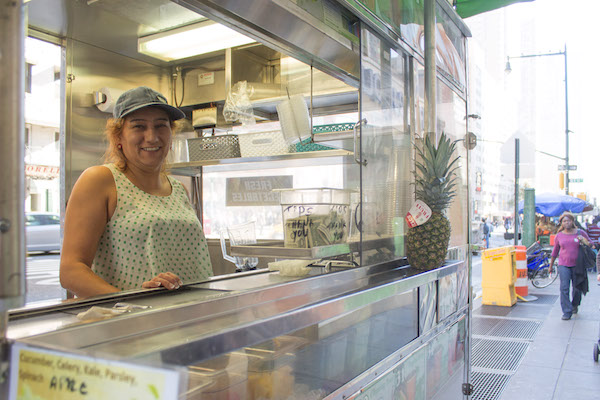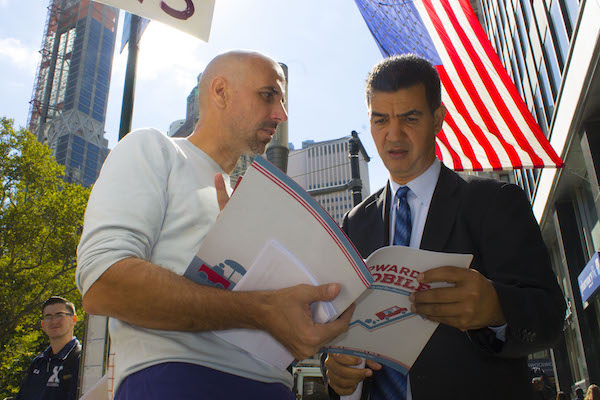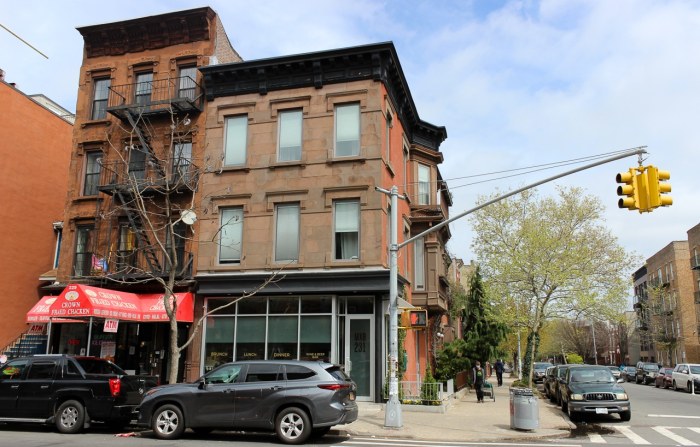
BY ZACH WILLIAMS | Acquiring one of the 5,100 permits issued by New York City to sell food on the street can take a long time, but Mohammed Attia found a relatively simple way: through a guy who knew a guy who knew a guy.
Attia is one of thousands of food cart operators who rent someone else’s permit in order to avoid trouble with the law and hefty fines. He pays a permit-holder $6,000 each year to operate in his name from April until October. They meet once each year to renew the permit with the city. And that’s the extent of the permit-holder’s contribution to vending smoothies at Attia’s food truck on Sixth Ave. (at W. 50th St.).
Several blocks away, Trancia Anabela Acosta makes smoothies in a cart on Eighth Ave. (btw. W. 50th & W. 51st Sts.). She applied for a permit eight years ago, but is still waiting. The immigrant from Uruguay said in an interview on Oct. 12 that she hopes to eventually have her own food cart with her husband, who currently sells peanuts eight blocks to the south. The current price of a black market permit is simply too much for them, she said.
“I need my permit. It’s a lot of money [to rent] this permit,” she said. “You rent the permit for full-term, two years. I think now it’s $17,000.”
An advocacy group called the Street Vendor Project — part of the Urban Justice Center — seeks to convince the City Council to raise or eliminate the cap on street vending permits issued by the Department of Health and Mental Hygiene. To further that cause, about a dozen members of the group gathered on Oct. 7 in front of 250 Broadway (btw. Park Pl. & Murray St.), where councilmembers have their offices.
As councilmembers and their staff entered or exited, Sean Basinski, director of the group (streetvendor.org), approached them with a report released the day before extolling the value of the approximately 20,000 street vendors in the city, and an offer of free Taiwanese dumplings from a cart brought for the occasion.
“We gotta stay on top of things and let them know we’re still here,” added Basinski, who said about 200 vendors and supporters attended a rally held across the street two weeks before.

There are about 16,300 street vendors throughout the city, according to the report called “Upwardly Mobile: Street Vending and the American Dream” (ij.org/report/upwardly-mobile). The economic activity of the vendors generated about $71.2 million in taxes in 2012, adds the report. Such a cash flow also reaches suppliers, supporting more than 1,000 more jobs citywide and $82 million in “valued added” to the local economy, according to the report.
“Value added, similar to gross domestic product, measures the value businesses create beyond the raw or intermediate goods they purchases,” states the report.
Elected officials ate the dumplings and perused the report in front of 250 Broadway that day, but they gave no indication of when the cap set by the department in 1983 might increase.
Councilmembers Ydanis Rodriguez, Jumaane Williams and Mathieu Eugene said in interviews that they support raising the cap, but none of them specifically said they would personally introduce legislation on the issue.
“I hope we can work together with the [City Council] Speaker Melissa Mark-Viverito, my other colleagues in the council and the administration to move some bill that will be good for the street vendors,” Councilmember Ydanis Rodriguez told Chelsea Now.
Rodriguez extended his arms and shrugged when asked on Oct. 7 how soon a bill could be introduced.
Such assurances are wearing thin, Basinski said in an Oct. 12 phone interview. He added that councilmembers have repeatedly said they “are working on it.”
“That’s been happening for way too long, in many forms, for over a year. We need some action,” Basinski said.
Opponents of the group’s effort to raise the cap include NYC Business Improvement District Association. Co-chairs Ellen Baer and Michael Lambert said in an Oct. 7 statement that the activists oversimplify the issue by focusing on the permit cap.
“Everyone agrees the street vending permit system is broken and reliant on a tangle of unevenly enforced rules that make the system unfair for everyone,” they said in the statement. “But pinning the ills of the system on the permit cap dramatically oversimplifies the issue, and [the] report fails to make a compelling case to New Yorkers that opening the floodgates to unlimited vending on our streets is the best way to fix a complex system. It’s time to have a serious conversation about a path forward that works for everyone.
In the meantime, Attia and other vendors continue waiting for a time when they will not have to rent a city permit from someone else.
“Basically it looks like I work for him but I don’t. This is my own cart,” Attia said. “I know people who have been on the waiting list for fifteen years and they still don’t have a permit,” he added. “I can be working in a store for fifteen or twenty years and I’m not going to have my own store, but I can be vending for four or five years, save some money, and then I can have my own business.”

















